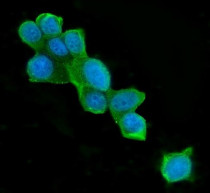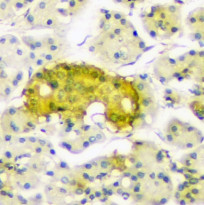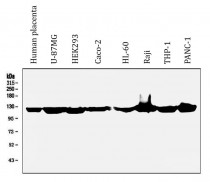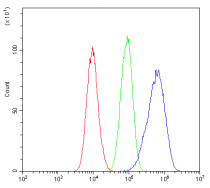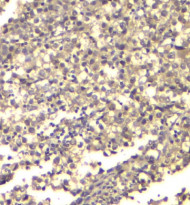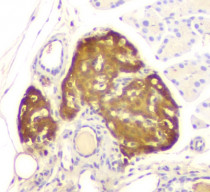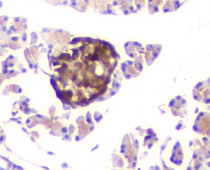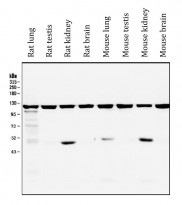ARG42696
anti-ATP Citrate Lyase antibody [5I2]
anti-ATP Citrate Lyase antibody [5I2] for Flow cytometry,ICC/IF,IHC-Formalin-fixed paraffin-embedded sections,Western blot and Human,Mouse,Rat
Overview
| Product Description | Mouse Monoclonal antibody [5I2] recognizes ATP Citrate Lyase |
|---|---|
| Tested Reactivity | Hu, Ms, Rat |
| Tested Application | FACS, ICC/IF, IHC-P, WB |
| Host | Mouse |
| Clonality | Monoclonal |
| Clone | 5I2 |
| Isotype | IgG2b |
| Target Name | ATP Citrate Lyase |
| Antigen Species | Human |
| Immunogen | Recombinant protein corresponding to M1-I180 of Human ATP Citrate Lyase. |
| Conjugation | Un-conjugated |
| Alternate Names | ACL; ATP-citrate synthase; Citrate cleavage enzyme; CLATP; EC 2.3.3.8; pro-S-; ATP-citrate; ATPCL |
Application Instructions
| Application Suggestion |
|
||||||||||
|---|---|---|---|---|---|---|---|---|---|---|---|
| Application Note | * The dilutions indicate recommended starting dilutions and the optimal dilutions or concentrations should be determined by the scientist. | ||||||||||
| Observed Size | ~ 120 kDa |
Properties
| Form | Liquid |
|---|---|
| Purification | Affinity purification with immunogen. |
| Buffer | 0.2% Na2HPO4, 0.9% NaCl, 0.05% Sodium azide and 4% Trehalose. |
| Preservative | 0.05% Sodium azide |
| Stabilizer | 4% Trehalose |
| Concentration | 0.5 mg/ml |
| Storage Instruction | For continuous use, store undiluted antibody at 2-8°C for up to a week. For long-term storage, aliquot and store at -20°C or below. Storage in frost free freezers is not recommended. Avoid repeated freeze/thaw cycles. Suggest spin the vial prior to opening. The antibody solution should be gently mixed before use. |
| Note | For laboratory research only, not for drug, diagnostic or other use. |
Bioinformation
| Database Links | |
|---|---|
| Gene Symbol | ACLY |
| Gene Full Name | ATP citrate lyase |
| Background | ATP citrate lyase is the primary enzyme responsible for the synthesis of cytosolic acetyl-CoA in many tissues. The enzyme is a tetramer (relative molecular weight approximately 440,000) of apparently identical subunits. It catalyzes the formation of acetyl-CoA and oxaloacetate from citrate and CoA with a concomitant hydrolysis of ATP to ADP and phosphate. The product, acetyl-CoA, serves several important biosynthetic pathways, including lipogenesis and cholesterogenesis. In nervous tissue, ATP citrate-lyase may be involved in the biosynthesis of acetylcholine. Multiple transcript variants encoding distinct isoforms have been identified for this gene. [provided by RefSeq, Dec 2014] |
| Function | Catalyzes the cleavage of citrate into oxaloacetate and acetyl-CoA, the latter serving as common substrate for de novo cholesterol and fatty acid synthesis. [UniProt] |
| Cellular Localization | Cytoplasm. [UniProt] |
| Calculated MW | 121 kDa |
| PTM | ISGylated. Acetylated at Lys-540, Lys-546 and Lys-554 by KAT2B/PCAF. Acetylation is promoted by glucose and stabilizes the protein, probably by preventing ubiquitination at the same sites. Acetylation promotes de novo lipid synthesis. Deacetylated by SIRT2. Ubiquitinated at Lys-540, Lys-546 and Lys-554 by UBR4, leading to its degradation. Ubiquitination is probably inhibited by acetylation at same site (Probable). [UniProt] |
Images (8) Click the Picture to Zoom In
-
ARG42696 anti-ATP Citrate Lyase antibody [5I2] ICC/IF image
Immunofluorescence: MCF7 cells were blocked with 10% goat serum and then stained with ARG42696 anti-ATP Citrate Lyase antibody [5I2] (green) at 2 µg/ml dilution, overnight at 4°C. DAPI (blue) for nuclear staining.
-
ARG42696 anti-ATP Citrate Lyase antibody [5I2] IHC-P image
Immunohistochemistry: Paraffin-embedded Human pancreatic cancer tissue. Antigen Retrieval: Heat mediation was performed in EDTA buffer (pH 8.0). The tissue section was blocked with 10% goat serum. The tissue section was then stained with ARG42696 anti-ATP Citrate Lyase antibody [5I2] at 1 µg/ml dilution, overnight at 4°C.
-
ARG42696 anti-ATP Citrate Lyase antibody [5I2] WB image
Western blot: 50 µg of samples under reducing condition. Human placenta, U-87MG, HEK293, Caco-2, HL-60, Raji, THP-1 and PANC-1 whole cell lysates stained with ARG42696 anti-ATP Citrate Lyase antibody [5I2] at 0.5 µg/ml dilution, overnight at 4°C.
-
ARG42696 anti-ATP Citrate Lyase antibody [5I2] FACS image
Flow Cytometry: A549 cells were blocked with 10% normal goat serum and then stained with ARG42696 anti-ATP Citrate Lyase antibody [5I2] (blue) at 1 µg/10^6 cells for 30 min at 20°C, followed by incubation with DyLight®488 labelled secondary antibody. Isotype control antibody (green) was mouse IgG (1 µg/10^6 cells) used under the same conditions. Unlabelled sample (red) was also used as a control.
-
ARG42696 anti-ATP Citrate Lyase antibody [5I2] IHC-P image
Immunohistochemistry: Paraffin-embedded Human testis cancer tissue. Antigen Retrieval: Heat mediation was performed in EDTA buffer (pH 8.0). The tissue section was blocked with 10% goat serum. The tissue section was then stained with ARG42696 anti-ATP Citrate Lyase antibody [5I2] at 1 µg/ml dilution, overnight at 4°C.
-
ARG42696 anti-ATP Citrate Lyase antibody [5I2] IHC-P image
Immunohistochemistry: Paraffin-embedded Mouse pancreas tissue. Antigen Retrieval: Heat mediation was performed in EDTA buffer (pH 8.0). The tissue section was blocked with 10% goat serum. The tissue section was then stained with ARG42696 anti-ATP Citrate Lyase antibody [5I2] at 1 µg/ml dilution, overnight at 4°C.
-
ARG42696 anti-ATP Citrate Lyase antibody [5I2] IHC-P image
Immunohistochemistry: Paraffin-embedded Rat pancreas tissue. Antigen Retrieval: Heat mediation was performed in EDTA buffer (pH 8.0). The tissue section was blocked with 10% goat serum. The tissue section was then stained with ARG42696 anti-ATP Citrate Lyase antibody [5I2] at 1 µg/ml dilution, overnight at 4°C.
-
ARG42696 anti-ATP Citrate Lyase antibody [5I2] WB image
Western blot: 50 µg of samples under reducing condition. Rat lung, Rat testis, Rat kidney, Rat brain, Mouse lung, Mouse testis, Mouse kidney and Mouse brain lysates stained with ARG42696 anti-ATP Citrate Lyase antibody [5I2] at 0.5 µg/ml dilution, overnight at 4°C.
